2017年人教版八年级英语
【人教版】2017版八年级英语上册期末复习知识点总结1 (32)
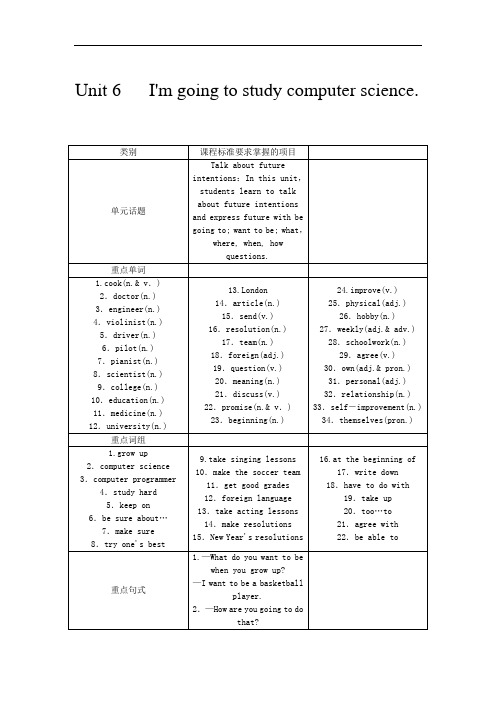
Unit 6I'm going to study computer science.第一课时Section A (1a~1c)§自主学习案用所给单词的适当形式填空。
1.My father is a computer programmer (program)in a big company.2.Why do you want to be a scientist(science)?3.What does he want to be when he grows(grow) up?4.Li Yundi is a famous pianist(piano)in the world.5.Li Ming wants to be a basketball player(play) like Yao Ming.§课堂导学案Step 1准备与热身(Preparation)Hello,everyone!We know every child has his own great idea. I think you do the same. When you grow up, maybe you want to be a teacher, a businessman, a pilot, or an engineer. Today we are going to talk about the topic about your intention. Turn to look at Unit 6:I'm going to study computer science.Look at the blackboard and read after me the target language for this unit.When you read,pay attention to going to,want to be,and what, where, when, how questions.Do you know what intention means? It means something you want to do or plan to do in the future. It is not something which will definitely happen.I will give you one minute to think about ways you already know to talk about future events. And you can use the question words where, when, what, how long to ask and answer questions.For example:Q:Where are you going next week?A:I'm going to summer camp.Q:How long are you staying?A:I'm staying for a week.Q:What are you going to do?A:I'm swimming there.From the above we know that -ing words express the future tense.Now look at the sentences in the speech bubble on page 41. In this unit, we are using-ing words to talk about things that may or may not happen. We are talking about plans.Step 2呈现与输入(Presentation)On page 41 you will find a box with twelve different jobs. Now you are going to rank the twelve jobs from the most interesting to the least interesting.And after that you shall fall into pairs to talk about the reasons.Step 3练习与体验(Practice)Listen and fill in the blanks. Read the phrases in the two columns first. Then listen to four conversations and draw lines connecting the jobs and the activities.Let's check the answers.Keys: 1→b; 2→c; 3→d; 4→aStep 4运用与生成(Production)Now in pairs go on to ask your partner what they are going to be and how they are going to do.Now I'll give you a model conversation and you may practice like this:A:What do you want to be when you grow up?B:I want to be a basketball player.A:How are you going to do that?B:I'm going to practice basketball every day.This period we've learnt the questions of what you are going to do, where you are going, how you are going to do that and when you are going to do.Plan first is a good start.Step 5巩固与提高(Progress)【探究点】What are you going to be when you grow up?你长大以后打算做什么?①“be going to+动词原形”构成一般将来时态,表示计划或安排要发生的动作,有时也可以表示推测将要或肯定会发生的动作,有“准备;打算”之意。
2017八年级英语下册全册单词表汇总(新人教版)
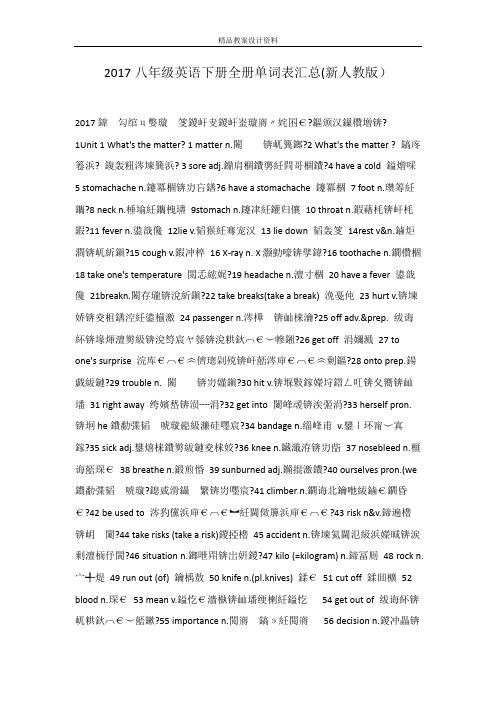
2017八年级英语下册全册单词表汇总(新人教版)2017ц?鏂颁汉鏁欑増锛?1Unit 1 What's the matter? 1 matter n.?2 What's the matter ? 鎬庝箞浜? 鍑轰粈涔堜簨浜? 3 sore adj.鐤肩棝鐨勶紝閰哥棝鐨?4 have a cold 鎰熷啋5 stomachache n.鑳冪棝锛岃吂鐥?6 have a stomachache 鑳冪棝7 foot n.瓒筹紝鑴?8 neck n.棰堬紝鑴栧瓙9stomach n.鑳冿紝鑵归儴10 throat n.鍜藉枆锛屽枆鍜?11 fever n.鍙戠儳12lie v.韬猴紝骞宠汉13 lie down 韬轰笅14rest v&n.鏀炬澗锛屼紤鎭?15 cough v.鍜冲椊16 X-ray n. X灏勭嚎锛孹鍏?16 toothache n.鐗欑棝18 take one's temperature 閲忎綋娓?19 headache n.澶寸棝20 have a fever 鍙戠儳21breakn.闂存瓏锛涗紤鎭?22 take breaks(take a break) 浼戞伅23 hurt v.锛堜娇锛夌柤鐥涳紝鍙椾激24 passenger n.?25 off adv.&prep. 绂诲紑锛堟煇澶勶級锛涗笉宸ヤ綔锛涗粠鈥︹€﹀幓鎺?26 get off 涓嬭溅27 toone's surprise 浣库€︹€︽儕璁剁殑锛屽嚭涔庘€︹€︽剰鏂?28 onto prep.鍚戯紱鏈?29 trouble n. ?30 hit v.锛堢敤鎵嬫垨鍣ㄥ叿锛夊嚮锛屾墦31 right away 绔嬪嵆锛涢┈涓?32 get into 闄峰叆锛涘弬涓?33 herself pron.锛坰he?34 bandage n.缁峰甫v.鐢ㄧ环甯﹀寘鎵?35 sick adj.鐢熺梾鐨勶紱鏈夌梾姣?36 knee n.鑶濈洊锛岃啙37 nosebleed n.榧诲嚭琛€38 breathe n.鍛煎惛39 sunburned adj.鏅掍激鐨?40 ourselves pron.(we ??41 climber n.鐧诲北鑰咃紱鏀€鐧昏€?42 be used to 涔犳儻浜庘€︹€︼紝閫傚簲浜庘€︹€?43 risk n&v.鍗遍櫓?44 take risks (take a risk)鍐掗櫓45 accident n.锛堜氦閫氾級浜嬫晠锛涙剰澶栭伃閬?46 situation n.鎯呭喌锛岀姸鍐?47 kilo (=kilogram) n.鍗冨厠48 rock n.宀╃煶49 run out (of) 鑰楀敖50 knife n.(pl.knives) 鍒€51 cut off 鍒囬櫎52 blood n.琛€53 mean v.54 get out of 绂诲紑锛屼粠鈥︹€﹀嚭鏉?55 importance n.э56 decision n.鍐冲畾锛屾妷鎷?57 control n.锟絵v.闄愬埗锛岀害鏉燂紝绠$悊58 be in control of 鎺岀?59 spirit n.鍕囨皵锛屾剰蹇?60 death n.姝伙紝姝讳骸61 give up 鏀惧純62 nurse n.鎶ゅ+2Unit 2 I'll help to clean up the parks. 1 clean up 鎵撴壂锛堟垨娓呴櫎锛夊共鍑€ 2 cheer v.娆㈠懠锛屽枬褰?3 cheer up 锛堜娇锛夊彉寰楁洿楂樺叴锛屾尟濂嬭捣鏉?4 give out 鍒嗗彂锛屾暎鍙?5 volunteer v.涔夊姟鍋?n.?6 notice n.?7 used to鏇剧粡鈥︹€︼紝杩囧幓鈥︹€?8 lonely adj.瀛ょ嫭鐨勶紝瀵傚癁鐨?9 several pron ?10 feeling n.?11 satisfaction n.婊¤冻锛屾弧鎰?12 joy n.楂樺叴锛屾剦蹇?13 owner n.鐗╀富锛屼富浜?14 journey n.?15 sign n.鏍囧織锛屼俊鍙?16 sick adj.鐢熺梾鐨勶紝鏈夌梾鐨?17 raise v.鍕熼泦锛屽緛闆?18 alone adv.屽崟鐙?lonely adj. 瀛ょ嫭19 repair v.?20 fix v.21 give away 璧犻€侊紝鎹愯禒22 wheel n.杞﹁疆锛岃疆瀛?23 letter n.淇★紝鍑?24 miss n.濂冲+锛屽皬濮?25 set up 寤鸿捣锛岃?26 make a difference 褰卞搷锛屾湁浣滅敤27 blind adj.鐬庣殑锛屽け鏄庣殑28 deaf adj.鑱嬬殑29 imagine v.锟絵n.?30 difficulty n.鍥伴毦锛岄毦棰?31 open v.寮€锛屾墦寮€32 door n.闂?33 carry v.鎷匡紝鎻愶紝鎵?34 train v.?35 excited adj.婵€鍔ㄧ殑锛屽叴濂嬬殑36 training n.璁?37 kindness n.浠佹厛锛屽杽鑹?38 clever adj.鐨?39 understand v.鐞嗚В?40 change v.鍙樺寲锛屾敼鍙?41 disabled adj.涓уけ鑳藉姏鐨勶紝鏈夋畫鐤剧殑42 strong adj.寮哄.鐨勶紝寮哄仴鐨?43 sir n.鍏堢敓44 madam n.?3Unit 3 Could you please clean your room? 1 rubbish n.鍨冨溇锛涘簾寮冪墿2 take out the rubbish 鍊掑瀮鍦?3 fold v.鎶樺彔?4 sweep v. 5 floor n. 鍦版澘6 mess n.鏉備贡锛涗笉鏁存磥7 throw v.鎵旓紱鎺?8 all the time 棰戠箒锛涘弽澶?9 neither adv.涔熶笉10 shirt n.11 pass v.缁欙紱閫掞紱璧拌繃锛涢€氳繃12 borrow v.鍊燂紱鍊熺敤13 lend v.鍊熺粰锛涘€熷嚭14 finger n.鎵嬫寚15 hate v.鍘?16while conj.鍦ㄢ€︹€︽湡闂达紱褰撯€︹€︾殑鏃跺€?17 snack n.鐐瑰18 chore n.鏉傚姟锛涗箯鍛虫棤鑱婄殑宸ヤ綔19 stress n.?20 waste n.?21in order to22provide v.鎻愪緵锛涗緵搴?23 anyway adv.鑰屼笖锛涘姞涔?24 depend v.渚濋潬锛涗俊璧?25 depend on 渚濋潬锛涗俊璧?26 develop v.鍙戝睍锛涘.澶?27 fairness n.э?28 since conj.浠庘€︹€︿互?29 neighbor (=neighbour) n.閭诲眳30 result n.鍚庢灉锛涚粨鏋?31 ill adj.鏈夌梾锛涗笉鑸掓湇32 drop v.钀戒笅锛涙帀涓?33 independence n.34 independent adj.?35 take care of 鐓ф枡锛涚埍鎶?36 fair adj. 鍚堢悊鐨勶紱閫傚綋鐨?4Unit 4 Why don't you talk to your parents? 151 allow v.?152 wrong adj.?what's wrong ? 153 guess v.鐚滄祴锛涗及璁?154 deal n.?big deal 155 work out 鎴愬姛鐨勫彂灞曪紱瑙e喅156 get on with叧绯昏壇濂?157 relation n.鍏崇郴锛涜仈绯伙紱浜ゅ線158 communication n.浜ゆ祦锛涙矡閫?159 argue v.浜夊惖锛涗簤璁?160 cloud n.浜戯紱浜戞湹161 elder adj.骞寸邯杈冮暱鐨?162 instead adv.浠f浛锛涘弽鑰岋紱鍗?163 whatever pron.浠讳綍锛涙瘡涓€164 nervous adj.鐒﹁檻鐨勶紱鎷呭咖鐨?165 offer 涓诲姩鎻愬嚭锛涜嚜鎰跨粰浜?166 proper adv.姝g‘鍦帮紱鎭板綋鍦?167 secondly adv.?168 communicate v.浜ゆ祦锛涙矡閫?169 explain v.?170 clear adj.涓嶅惈娣风殑171 copy v.?172 return v.鍥炴潵锛涘洖鍘?173 member n.鎴愬憳锛涘垎瀛?174 pressure n.鍘嬪姏175 compete v.鎶?176 opinion n.177 skill n.鎶€鑹猴紱鎶€宸?178 typical adj.鍏稿瀷鐨?179 football n.瓒崇悆180 cut out 鍒犲幓锛涘垹闄?181 continue v.?182 compare v.姣旇緝183 compare ith鈥??184 crazy adj.涓嶇悊鏅虹殑锛涚柉鐙傜殑185 push v.鎺ㄥ姩锛涚Щ鍔?186 development n.鍙戝睍锛涘彂鑲诧紱鎴愰暱187 cause v.閫犳垚锛涘紩璧?188 usual adj.閫氬父鐨勶紱瀵诲父鐨?189 perhaps adv.5Unit 5 What were you doing when the 190 rainstorm n.?191 suddenly adv.绐佺劧锛涘拷鐒?192 alarm n.闂归挓193 go off 锛堥椆閽燂級鍙戝嚭鍝嶅0194 pick up 鎺ョ數璇?195 strange adj.196 storm n.?197 report v.鎶ラ亾锛涘叕甯?198 area n.鍦板煙锛涘湴鍖?199 wind n.椋?200 light n.鍏夛紱鍏夌嚎锛涘厜浜?201 wood n.202 window n.绐楋紱绐楁埛203 flashlight n.204 match n.煷澶嶆暟褰㈠紡锛?matches 205 beat v.鏁叉墦锛涢敜鐮?206 heavily adv.鍦ㄥ緢澶х▼搴︿笂锛涘ぇ閲忓湴207 against prep.鍊氾紱纰帮紱鎾?208 asleep adj.鐫$潃209 fall asleep 杩涘叆姊︿埂锛涚潯鐫€210 die down 閫愭笎鍙樺急锛涢€愭笎娑堝け211 rise v.澧炲姞锛涙彁楂橈紱澧炲己212 apart adv.垎寮€213 passage n.?214 pupil n.瀛︾敓215 bright adj.鏄庝寒鐨勶紱鍏夌嚎鍏呰冻鐨?217 completely adv.褰诲簳鍦帮紱瀹屽叏鍦?218 silence n.娌夐粯锛涚紕榛橈紱鏃犲0219 in silence 娌夐粯锛涙棤澹?220 recently adv.涓嶄箙鍓?221 terrorist n.鎭愭€栦富涔夎€咃紱鎭愭€栧垎瀛?222 date n.鏃ユ湡锛涙棩瀛?223 tower n.濉旓紱濉旀ゼ224 at first 棣栧厛锛涙渶鍒?225 realize v.鐞嗚В?226 truth n.瀹炴儏锛涗簨瀹?閲嶇偣璇嶇粍I was so busy looking for the umbrella that Ididn't see a car coming. took a hot shower 6Unit 6 An old man tried to move the mountains. 228once upon a time 浠庡墠229 shootv.(shot)灏勫嚮锛涘彂灏?230 begin v.(began)寮€濮?231 god n.绁烇紱涓婂笣232 remind v.鎻愰啋锛涗娇鎯宠捣233 bit n.鏈夌偣锛涚◢寰?234 silly adj.鎰氳牏鐨勶紱涓嶆槑浜嬬悊鐨?235 instead of 浠f浛锛涘弽鑰?236 monkey n.鐚村瓙237 magic adj.?238 birth n.鍑虹敓锛涜癁鐢?239 give birth (to do sth.)т粩240 stick n.妫嶏紱鏉?241 hide v.闅愯棌锛涢殣钄?242 tail n.灏撅紱灏惧反243 turn nto 鍙樻垚244 Western adj.瑗挎柟鐨?245 weak adj.铏氬急锛涙棤鍔涚殑246 stepsister n.缁у?247prince n.鐜嬪瓙248 fit v.閫傚悎锛涘悎韬?249 couple n.涓や汉锛涗袱浠朵簨鐗?250 smile v.251 marry v.252 get married 253 born v.鍑虹敓254 be born 鍑虹敓255 object n.鐗╀綋锛涚墿鍝?256 gold adj.閲戣壊鐨?257 emperor n. 鍥界帇258 underwear n.鍐呰。
人教版八年级英语上课文翻译2017
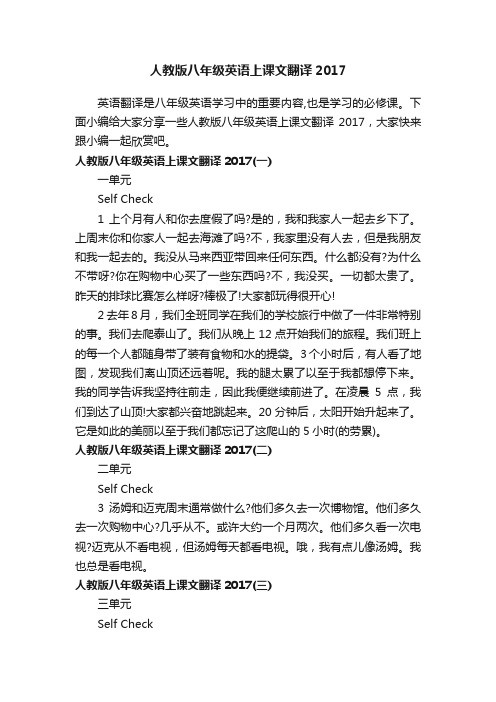
人教版八年级英语上课文翻译2017英语翻译是八年级英语学习中的重要内容,也是学习的必修课。
下面小编给大家分享一些人教版八年级英语上课文翻译2017,大家快来跟小编一起欣赏吧。
人教版八年级英语上课文翻译2017(一)一单元Self Check1 上个月有人和你去度假了吗?是的,我和我家人一起去乡下了。
上周末你和你家人一起去海滩了吗?不,我家里没有人去,但是我朋友和我一起去的。
我没从马来西亚带回来任何东西。
什么都没有?为什么不带呀?你在购物中心买了一些东西吗?不,我没买。
一切都太贵了。
昨天的排球比赛怎么样呀?棒极了!大家都玩得很开心!2 去年8月,我们全班同学在我们的学校旅行中做了一件非常特别的事。
我们去爬泰山了。
我们从晚上12点开始我们的旅程。
我们班上的每一个人都随身带了装有食物和水的提袋。
3个小时后,有人看了地图,发现我们离山顶还远着呢。
我的腿太累了以至于我都想停下来。
我的同学告诉我坚持往前走,因此我便继续前进了。
在凌晨5点,我们到达了山顶!大家都兴奋地跳起来。
20分钟后,太阳开始升起来了。
它是如此的美丽以至于我们都忘记了这爬山的5小时(的劳累)。
人教版八年级英语上课文翻译2017(二)二单元Self Check3 汤姆和迈克周末通常做什么?他们多久去一次博物馆。
他们多久去一次购物中心?几乎从不。
或许大约一个月两次。
他们多久看一次电视?迈克从不看电视,但汤姆每天都看电视。
哦,我有点儿像汤姆。
我也总是看电视。
人教版八年级英语上课文翻译2017(三)三单元Self Check1 辛勤的跑得快文静的严厉的;严肃的;稳重的跳得高聪明的2 我哥哥比我更风趣。
他能让人们大笑。
我很外向,但是我最好的朋友比我外向得多。
我哥哥和我姐姐一样稳重。
他们都喜欢学习。
我表妹跑得比我快。
她也比我高。
吉姆不如汤姆友好,因此汤姆比吉姆有更多的朋友。
人教版八年级英语上课文翻译2017(四)Self Check1 饺子馆是城市里最便宜的饭店。
人教版2017初中八年级(上册)英语全册教案WORD
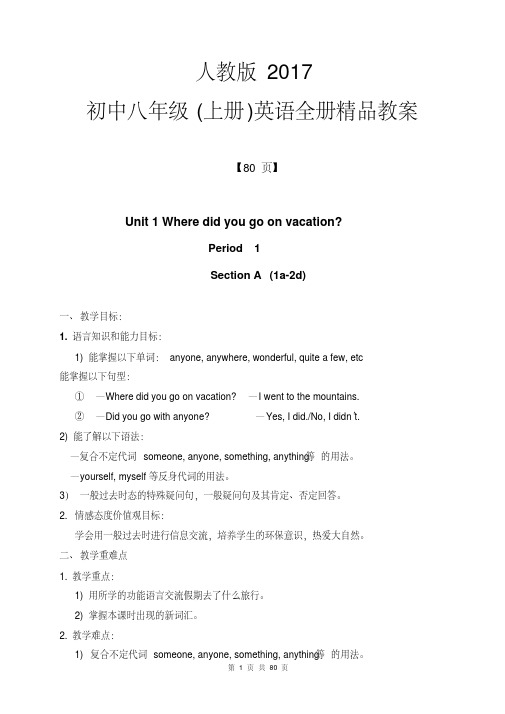
人教版2017
初中八年级(上册)英语全册精品教案
【80页】
Unit 1 Where did you go on vacation?
Period 1
Section A (1a-2d)
一、教学目标:
1. 语言知识和能力目标:
1) 能掌握以下单词:anyone, anywhere, wonderful, quite a few, etc
能掌握以下句型:
①—Where did you go on vacation? —I went to the mountains.
②—Did you go with anyone? —Yes, I did./No, I didn’t.
2) 能了解以下语法:
—复合不定代词someone, anyone, something, anything等的用法。
—yourself, myself等反身代词的用法。
3)一般过去时态的特殊疑问句,一般疑问句及其肯定、否定回答。
2. 情感态度价值观目标:
学会用一般过去时进行信息交流,培养学生的环保意识,热爱大自然。
二、教学重难点
1. 教学重点:
1) 用所学的功能语言交流假期去了什么旅行。
2) 掌握本课时出现的新词汇。
2. 教学难点:
1) 复合不定代词someone, anyone, something, anything等的用法。
第 1 页共80 页。
2017人教版英语八年级下期末试卷
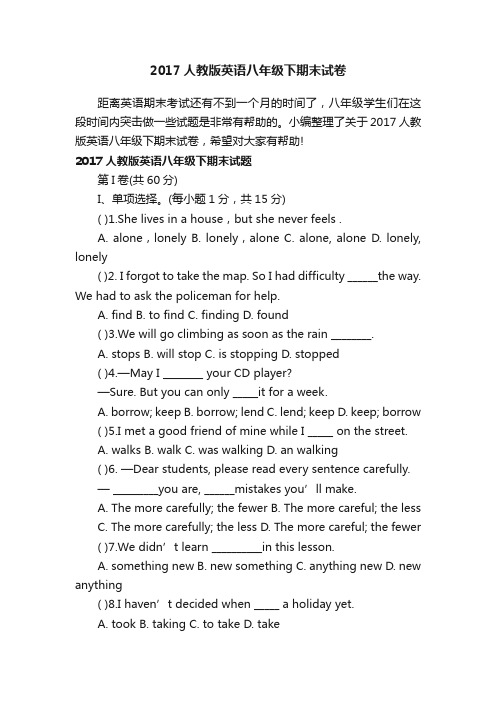
2017人教版英语八年级下期末试卷距离英语期末考试还有不到一个月的时间了,八年级学生们在这段时间内突击做一些试题是非常有帮助的。
小编整理了关于2017人教版英语八年级下期末试卷,希望对大家有帮助!2017人教版英语八年级下期末试题第I卷(共60分)I、单项选择。
(每小题1分,共15分)( )1.She lives in a house,but she never feels .A. alone,lonelyB. lonely,aloneC. alone, aloneD. lonely, lonely( )2. I forgot to take the map. So I had difficulty ______the way. We had to ask the policeman for help.A. findB. to findC. findingD. found( )3.We will go climbing as soon as the rain ________.A. stopsB. will stopC. is stoppingD. stopped( )4.—May I ________ your CD player?—Sure. But you can only _____it for a week.A. borrow; keepB. borrow; lendC. lend; keepD. keep; borrow( )5.I met a good friend of mine while I _____ on the street.A. walksB. walkC. was walkingD. an walking( )6. —Dear students, please read every sentence carefully.—_________you are, ______mistakes you’ll make.A. The more carefully; the fewerB. The more careful; the lessC. The more carefully; the lessD. The more careful; the fewer( )7.We didn’t learn __________in this lesson.A. something newB. new somethingC. anything newD. new anything( )8.I haven’t decided when _____ a holiday yet.A. tookB. takingC. to takeD. take( )9.Tom ______the USA. He ________back in two months.A. has gone to; comesB. has gone to; will beC. has been to; comesD. has been to; will be( )10.—They didn’t go to the park yesterday.—___________.A. So we didB. So did weC. Neither we didD. Neither did we( )11.She finds _______hard to finish the work on time. She only has five minutes left.A. thatB. thisC. itD. its( )12.He eats ________food, so he is _____fat.A. much too; too muchB. much too; many tooC. too much; much tooD. too much; many too( )13.—Is this your book?—No, it is ______book. It belongs to_______.A. his; hisB. his; himC. him; hisD. him; him( )14.She used to ______ in the morning, but now she is used to ________ at night.A. read; readB. read; readingC. reading; readD. reading; reading( )15.He ______ much food _____the poor family during the hard time.A. provided; toB. offered; withC. provided; withD. provided; forⅡ、完形填空。
2017英语人教版八年级上册课件:Unit 5 Do you want to watch a game show(图片版,共69张ppt)

1.What do you think of talk shows?(教材P33)你认为脱口秀节 目怎么样? [解读] What do you think of...?意为“你认为……怎么样?”或“你觉 得……怎么样?”,常用来询问对方的意见或看法,of后可跟人也可跟 物,相当于“How do you like...?”。 What do you think of talk shows? =How do you like talk shows? 你觉得脱口秀怎么样? What does Tom think of the book? 汤姆认为这本书怎么样? 注意这两个句型中的what和how不能混用。
16
单元知识导览
8
单元知识导览
教材要点解读
单元语法突破
Section A
Section B
名师解题
9
单元知识导览
教材要点解读
单元语法突破
Section A
Section B
10
单元知识导览
教材要点解读
单元语法突破
Section A
Section B
3.I don’t mind them.(教材P33)我不介意它们。 [解读] mind做动词,意为“介意;对(某事)烦恼”,后面跟名词、动词 -ing形式或从句,不能跟动词不定式。 I don’t mind the hot weather. 我不介意炎热的天气。 Do you mind waiting a moment? 你介意等一会儿吗? Do you mind if I call you later? 晚点儿给你打电话你介意吗?
★ ★★ ★ ★★ ★ ★ ★★ ★ ★ ★★
3
单元知识导览
2017年人教版八年级英语上册知识点总结(全)
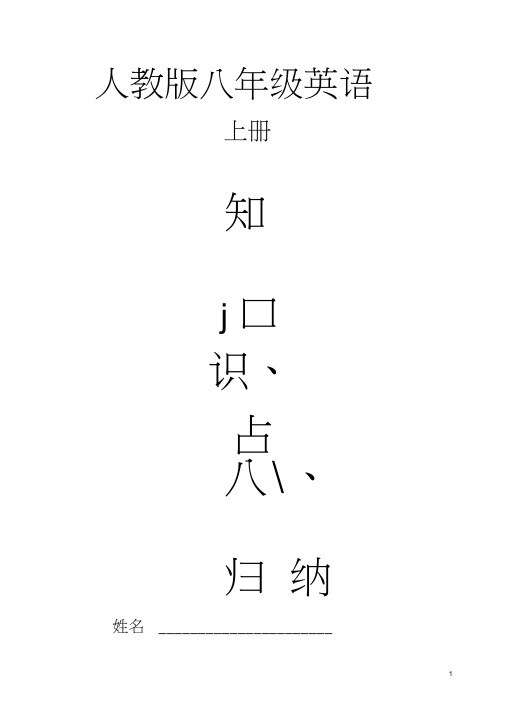
人教版八年级英语上册知j 口识、占八\、归纳姓名 ______________________学校 ______________________班级_______________________Unit 1 How often do you exercise ?一、词汇精讲1、always、usually、often、sometimes、hardly ever 和neveralways、usually、often、sometimes、hardly ever 和never 是英语中最常见的频度畐寸词。
(1)always的频度为100%,表示动作重复、状态继续,中间没有间断,意思是总是” 永远地”。
The sun always rises in the east and sets in the west太阳总是东升西落。
(2)usually的频度为70%左右,意为通常” 平常”即很少有例外。
He usually goes to bed at ten o '(他通常10 点钟睡觉。
(3)often的频度为50%左右,意为常常”但不如usually那么频繁,表示动作重复,中间有间断。
He is ofte n late for school. 他上学经常迟到。
(4)sometimes的频度为20%左右,意为有时”表示动作偶尔发生。
可以位于句首,以示强调。
多用于一般现在时。
It is sometimes hot and sometimes cold. 天气忽冷忽热。
Sometimes he does it this way and sometimes he does it that way.他有时这样做,有时那样做。
(5)hardly ever的频度为5%左右,意为几乎不”偶尔”表频率,位置是行前beI hardly ever go out these days. 这些天我几乎不出门。
(6)never的频度为0,意为从来不”永不”My pare nts are n ever late for work. 我父母上班从来不迟至叽【拓展】(1)这些副词在句子中的位置基本相同,一般放在助动词、be动词或情态动词之后,行为动词之前。
【人教版】2017版八年级英语上册期末复习知识点总结1 (35)

Unit 4What's the best movie theater?第一课时Section A (1a~1c)教学设计§自主学习案根据句意及汉语提示完成单词。
1.There is a big theater(戏院)in our town. It's next to my house.2.It's comfortable(舒服的)to sit on this sofa and read some books.3.There are five hundred seats(座位) in the meeting room.4.I often go to Guangming Cinema because it's close (近的)to my home.5.I need to buy three tickets(票). Can you help me?§课堂导学案Step 1准备与热身(Preparation)T: Where do you usually watch movies?S1: …Theater.S2: …Theater.T: Why do you go to that movie theater?S1: Becau se it's…S2: Because it has…Step 2呈现与输入(Presentation)How do you choose a cinema to go to? Here are come things about cinemas.Please decide which is important and which is not important.Discuss which items are important. Maybe new movies are important because we go to a cinema to see the new, not to review the old.Step 3练习与体验(Practice)Listen to understand.Three people are talking about several theaters and their qualities. After listening, please write down the three names of the three theaters.Let's check the answers!Step 4运用与生成(Production)Can you imagine what cinema is the best? Make a list of its qualities.A.It is the biggest one.B.It has the biggest screen.C.It's the closest to home.D.It has the shortest waiting time.E.It has the best sound.F.It has the most comfortable seats.Now talk about the theater you know.Ask and answer like this:A:What's the best movie theater?B:Sun Cinema.It's the cheapest.A:But I think Moon Theater has the most comfortable seats.…This period we've learnt how to talk about the movie theater and how to describe a place-our town.We made an interview of our town. By this we know about our town.And from this class we know that a good plan is a good start to success.We also learn that to be the best,to be core. Then you'll be great.Step 5巩固与提高(Progress)【探究点】It has the most comfortable seats.它有着最舒适的座位。
- 1、下载文档前请自行甄别文档内容的完整性,平台不提供额外的编辑、内容补充、找答案等附加服务。
- 2、"仅部分预览"的文档,不可在线预览部分如存在完整性等问题,可反馈申请退款(可完整预览的文档不适用该条件!)。
- 3、如文档侵犯您的权益,请联系客服反馈,我们会尽快为您处理(人工客服工作时间:9:00-18:30)。
2017年人教版八年级英语(下)第一、二单元检测试卷姓名_____________ 得分_____________一、词汇考查。
(10分)A.根据句意及首字母提示补全下列单词。
1. —I have a bad cold.—I’m sorry to h ________ that.2. I think I can f________ up the clock.3. It’s i ________ for us to eat healthy food.4. You can i_______ how different the table manners there are from ours.5. Opening and c ________ doors are difficult for some disabled people.B.用括号内所给单词的适当形式填空。
6. Tom has __________ (few) Christmas cards than I.7. My parents want me _______ (stay) at home every night because it’s dangerous outside.8. Would you like ______(clean) up the city parks?9. He spends about two hours_______(do) his homework.10. Eating vegetables can help you __________(keep) healthy.二、单项选择(15分)( )11. —What’s _______ matter with you?— I;m not feeling well.A. aB. anC. theD. /( )12. There are _______ apples on the table. You may have them.A. a littleB. a fewC. fewD. little( )13. ________the doctor, the boy was saved.A. ThanksB. Thanks toC. Thank forD. Because( )14. ―Should we go to the doctor?―No, you _________.A. shouldn’tB. can’tC. mustn’tD. couldn’t( )15. You shouldn’t ________ your hope. Everything will be better.A. give upB. fix upC. cheer upD. put up( )16. A lot of meeting were______ because of the dangerous disease.A. turned offB. set offC. put offD. taken off( )17. Some people plan to ______ a volunteer project to help the disabled children.A. put upB. think upC. set upD. cheer up ( )18. Pollution is a serious problem. Scientists have _______ some good ways to save it.A. come up withB. come onC. come outD. come up( )19. The woman in red _____ a teacher. She works in a hospital now.A. used to beB. is used to beingC. was used to beD. is( )20. Give up _____, it is bad for your health.A. smokeB. to smokeC. smokingD. smoked( )21. We all feel _____ after hearing of the ______ news.A.excited,excitedB.exciting,excitingC.excited,excitingD.exciting,excited( )22. I’d like you___ for a picnic with us.A. goB. to goC. goingD. went( )23. With the help of the government, we will make ___possible for every student to have free textbook in 2007.A. thatB. thisC. itD. one( )24. _______ the bad weather, the swimming match had been put off.A. Because ofB. Thanks toC. With the help ofD. Because( )25. ―Mary failed the exam again.―Sorry to hear that. We should do something to _____.A. cheer on herB. cheer up herC. cheer her onD. cheer her up三、完形填空(10分)We live in computer age (时代). People 26 scientists, teachers, writers and even students use computers to do all kinds of work. But more than 30 years ago, 27 couldn't do much. They were very big and expensive. Very 28 people were interested in them and knew how to use them. Today computers are smaller and 29 . But they can do a lot of work; many people like to use them. Some people 30 have them at home.Computers become very important because they can work 31 than people and make fewer mistakes. Computers can 32 people do a lot of work. Writers now use computers to 33 . Teachers use them to help teaching. Students use them to 34 . Computers can also remember what you 35 them. Computers are very useful and helpful. They are our friends. Do you want to have a computer?( )26. A. like B. as C. and D. with( )27. A. students B. scientists C. teachers D. computers( )28. A. few B. a few C. little D. a little( )29. A. cheap B. cheaper C. more expensive D.expensive( )30. A. even B. still C. already D. yet( )31. A. fast B. faster C. slow D. slower( )32. A. help B. make C. stop D. use( )33. A. write B. play C. study D. learn( )34. A. sing B. study C. dance D. watch( )35. A. put in B. put on C. put into D. put up四、阅读理解。
(30分)APeter was an inventor. His job was to invent new things, and he worked when he had an idea. His workroom was in his house, so he could work whenever he wanted to. Sometimes he worked seven days a week and sometimes he didn’t work for days. He did all his work right at home, but he left the house to go to meetings sometimes.Pet er usually got up at about five o’ clock. He made some tea and started to work at six. He drank tea all day—he couldn’t work without it—but he didn’t eat anything until in the evening.First, Peter cleaned the workroom and turned on the answer-phone becaus e he couldn’t talk to people when he had an idea. Then he started to work. He usually had a rest after two or three hours, but he didn’t leave the workroom. He did something different to help him relax. Sometimes he did some exercise, and sometimes he list ened to music. He usually stopped working at about nine o’ clock in the evening. He thought about his work most of the time, even when he was out. He was interested in what was around him and he liked looking for new ideas and new problems to solve.阅读短文,完成句子36. Peter was an ______.37. Peter did his work at home, but he left his house to have ______ sometimes.38. When he was working at daytime he didn’t ______ anything until in the evening.39. He ______ the answer-phone because he couldn’t talk to other s.40. To relax, he often did some exercise and ______ in his workroom.BTom is a schoolboy. He is only seven years old, but he is very busy on weekdays. One Saturday he decided to relax himself, so he went to the cinema.It was the first time for him to do that. He bought a ticket and then went in. But after two or tree minutes he came out, bought a second ticket and went in again. After a few minutes he came out again and bought a third ticket. Two or three minutes later he came out and asked for another ticket. Then the girl in the ticket office asked him, “Why did you buy so many tickets? How many friends did you meet?” Tom answered. “No, I have no friend here. But a big boy always stops me at the door and tears(撕) my ticket.”根据材料内容,选择最佳答案。
